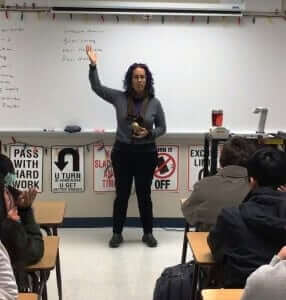Melissa Ambrose, MSW has been at Oceana High School, a small alternative high school just outside of San Francisco, for 18 years. Before getting her Masters in Social Work and becoming the Wellness Counselor, she taught Humanities there for nine years. Despite only having about 600 students, Oceana is one of the most diverse high schools in California; Melissa feels deeply honored and inspired to be part of such a dedicated and generous community.

We are a beleaguered group, but full of good intentions. Our purpose in this meeting is to keep the mission of the school in mind as we make significant decisions about running the school. As soon as the whole crew is there, settled in with snacks, the facilitator begins our meeting with the ringing of a bell. I am filled with gratitude as I close my eyes and take a full, deep breath. I need this moment, this quiet. I need to rest my mind. I can hear my colleagues breathing deeply and the energy in the room calms noticeably. We sit for three minutes and allow ourselves to fully transition from our insanely busy day to this important meeting. A bell rings and we move on to the first agenda item.
Our agenda is packed and timed to the minute. We approve a new dress code that doesn’t break down by gender or discriminate against our gender non-conforming students. We decide which issues need to be elevated to the whole staff for discussion and consensus-based decision making. Working by consensus can be stressful and exhausting and requires tremendous time, effort, and patience. It is a messy process in which we encourage all to participate, especially those who don’t agree with the majority.

During the initial debate about the merits of integrating mindfulness at the start of our AC meetings, one of the student members noted that her Humanities class is now practicing up to five minutes each day. She feels much better after each session and was confident it would help her focus during our long meetings. So, naturally she voted in favor of the idea.
The consensus process of adding mindfulness to our meetings this year has been a moving and delightful reminder of why I have worked at Oceana for 18 years. It highlights our focus on making sure our decisions are kind and beneficial for both staff and students.
Melissa graduated from our Year-Long Program in 2015.
